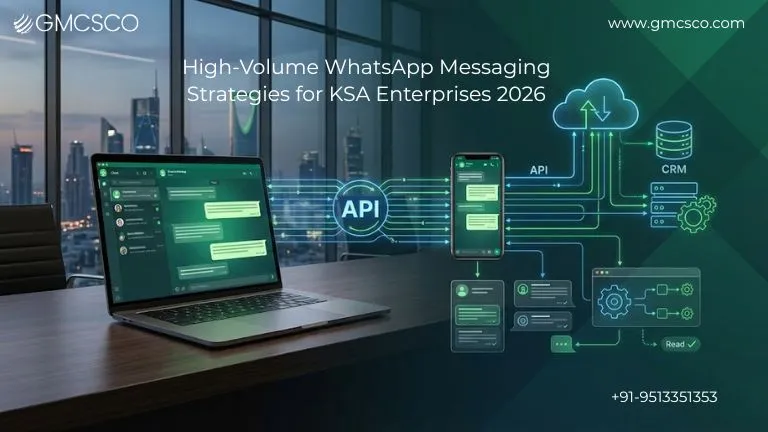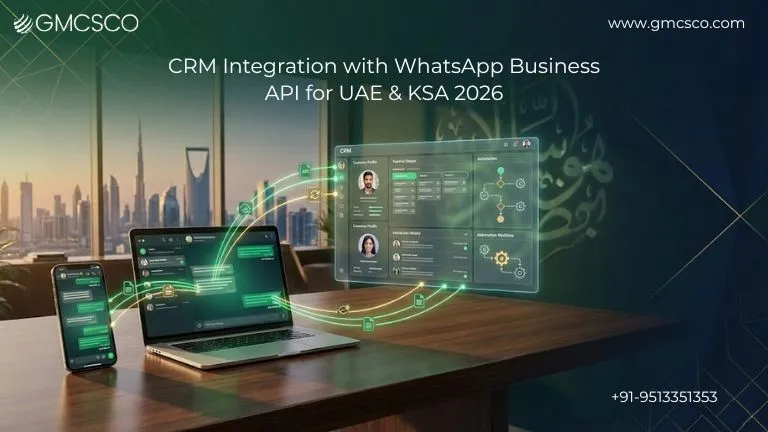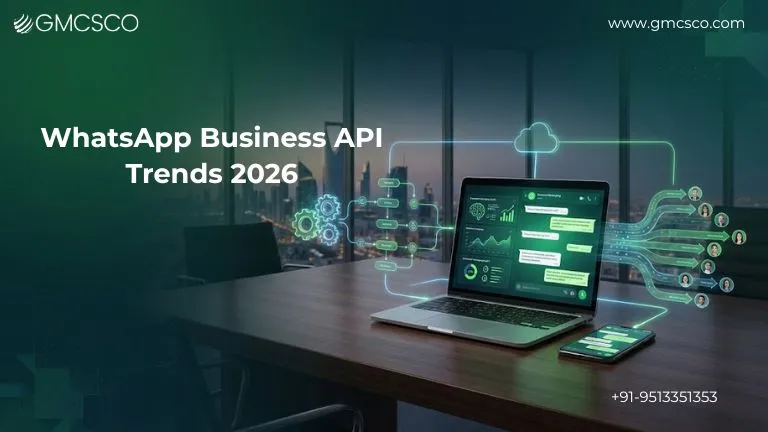High Volume Messaging Mastery WhatsApp Business API Strategies for KSA Enterprises in 2026
Ahlanwasahlan, fellow KSA business leaders! A: In a country where Saudis send more than twenty billion WhatsApp messages each and every day, high volume messaging is not a nice to have it’s your competitive advantage versus the big players across the world. Two thousand twenty six is beginning; scaling for enterprises is easier with Meta updates, though strictly for those who play it smart. So let’s look at big-player strategies in an area like finance or logistics, where volume meets precision. Begin with portfolio pacing Rolled out from December 2025 to February 2026 This groups your sends and feedback checks so you’re less likely to spam flag. For a bank in Riyadh, you send hundreds of thousands notifications on transactions without throttle. You may be able to send as many as forty five messages per user, and all it requires is a short rest in between. Default rate is 80 mps per number with enterprise upgrade paths. Key strategy: Segment your audience. Tag users from CRM integrations. VIP customers get individual updates, while the public followers receive mass mail for promotions only. This is the mentality that pushes strong retention in KSA where ninety five percent of adults use WhatsApp. A utility company that sends bill reminders including Pay Now buttons can see a 30% increase in conversions. Compliance violation Continue with approved forms for any start out the 24 hour timeframe. Get billable Saudi Riyal minute rundown guidance so you can get costs under control. Marketing messages are an expensive medium, therefore you should focus on service focused messages – use words that inspire our clients to purchase more and not think twice. Just use WhatsApp for bots when you actually want to automate something for a purpose. General AI discussion is disallowed by rule two zero to the six. A logistics company might now automate responses like Shipment delayed Reply Yes for details and serve thousands of users at once even if it doesn’t have enough staff to do so. Enterprise tip Track performance with the Business Management API. Monitor delivery rates, opens and button clicks in order to more effectively hone your approach. High volume messaging is not simply communication, but data driven growth. Looking to ramp up your high volume game? Unlock High Volume Setup Book Your KSA Enterprise Consultation Now The way things are going, Insha’Allah these strategies will take your business to new heights within the age of digital KSA 2026. Importance of High Volume WhatsApp Messaging for KSA Businesses Saudi Arabia is one of the biggest WhatsApp markets worldwide. So customers want the up to minute updates, real time communication. Enterprises can benefit from high-volume messaging to;. Reach customers instantly Reduce call center load Improve transaction transparency Increase customer trust Portfolio Pacing and Message Throughput Background Information Portfolio pacing is what protects your business reputation and delivery rates. Key elements of pacing include Batch based message sending Automated feedback evaluation Pause mechanisms after high bursts Quality score dependency Benefits for enterprises Prevents spam classification Maintains high delivery rates Allows faster scaling Protects business portfolio health Silent delivery drops are going to smack you in the face if you disregard pacing. Also Read About https://gmcsco.com/whatsapp-api-access-requirements/ Message Volume Planning for Enterprise Scenarios Just because it’s a high volume doesn’t mean that it’s out of control. Plan messaging based on Use case priority User engagement history Message type cost Time sensitivity Recommended message categories Transactional alerts Account updates Service notifications Critical reminders Opted in promotions You should have specific pacing and performance benchmarks for each category. Improve Results with Advanced Audience Segmentation Scalable messaging is built on segmentation. Segment users by Customer value Transaction frequency Location within KSA Language preference Engagement behavior Benefits of segmentation Higher read rates Lower block rates Better conversion Lower messaging cost Mass mailing without breaking it down is the quickest way to drop your quality scores. Also Read About WhatsApp Business API Creative Theory for High Volume Campaigns Templates are what make your messages scale, or not. Best practices for templates Clear first line purpose Utility focused language Actionable buttons Personalized variables Arabic first copy in easy terms Templates should be addressing a user problem and not telling people to buy. Cost Efficient High Volume Messaging When there is transparency in SAR billing, the price for cost control is right. Optimize spend by Using utility templates where possible Reducing unnecessary follow ups Avoiding repeated marketing blasts Tracking cost per delivered message Value per message is what drives successful companies not just volume. Schedule your free consultation with us. Automation Without Risk in 2026 Automation must remain controlled. Allowed automation includes Status confirmations Interactive quick replies Guided customer journeys Predefined workflows Disallowed automation includes Open ended conversations General AI chat Unverified response logic Well designed automation reduces the work without compromise on compliance. Real-Time Insight to Track and Analyze for Better Performance Sending high volumes will need to be monitored. Key metrics to track Messages sent Messages delivered Messages read Button clicks User replies Block rate Analytics insights help Identify fatigue Improve templates Refine segmentation Protect quality ratings Data is the currency of scalable growth. Also Read About WhatsApp chatbot Development Services Vertical Specific High Volume Use Cases in KSA Banking and Finance Transaction alerts OTP messages Account notifications Logistics and Supply Chain Shipment updates Delay notifications Delivery confirmations Utilities Bill reminders Service outage alerts Payment confirmations Ecommerce Order confirmations Delivery tracking Return updates All sectors benefit uniquely and the mandate is universal. High Volume Messaging No-No’s to Look Out for Messaging with no clear opt in Messaging users excessively in a certain time period Shifting utility messages to a promo voice Ignoring quality metrics Using non approved automation So, if you want to avoid these mistakes and sustain your growth over the long term. Contact Us Today How GMCSCO Ensures Secure Scalability for the Enterprise GMCSCO is designed to support large scale American Messaging is effective and efficient in your messaging campaign. Portfolio pacing setup CRM and ERP integrations Template creation and approval Automation workflow design Performance analytics Compliance monitoring We magnify without danger. By Step High Volume WhatsApp for 2026 Step 1: Conduct an audit of your existing messaging – volume and quality. Step 2: Value and intent Segmentation of users Step 3: Design compliant






